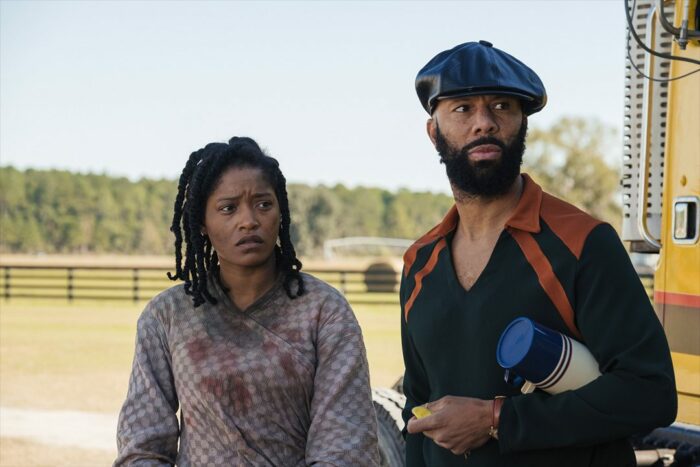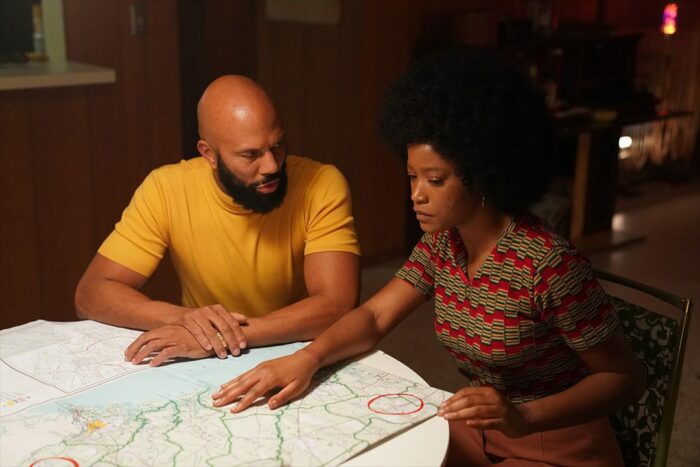The best way to approach a movie is without knowing anything about it. No pictures, no trailers. Merely the title and cast. Trailers often spoil the entire film, as here, though not because of bad P.R. but a narrow script lacking dimension. Sadly, racism still exists amongst millions in America. That message is said loud and clear in first-time Writer/Director Krysten Ver Linden’s film. We begin Alice’s story in a Georgia plantation where Alice (Keke Palmer) is enslaved. Alice’s Master, Paul Bennett (Jonny Lee Miller) is a relentless sadist. When one of the prisoners attempts to escape, he’s instantly murdered. The death of Alice’s friend is enough to make her snap, causing Alice to attack Paul and escape the plantation, finally setting foot on land free from her captors.

Much like a Twilight Zone episode, nothing is as it seems. The reality of Alice’s situation is much more terrifying than she could have imagined. The year is 1973, slavery has been abolished, and the civil rights movement is in full swing. After learning the truth, Alice seeks revenge on those who stole her right to live as a free woman. What should feel like a celebratory “fight the power” picture is a lackluster idea conceived from a half-organized script. Room for tangible character progression is pushed aside for standard writing techniques.
For instance, when Alice arrives in a stranger’s apartment, the television stations play clips from various infamous moments during the civil rights movement on each channel the man flips through. How did all these events so conveniently happen within the same day? Secondly, how Alice learns about humanity after the Civil War is implausible. She skims through a series of books and happens to land on the chapter about the emancipation proclamation? When Alice steps into that same stranger’s truck, she turns into an overnight Black Panther, ready to take on the man. That’s difficult to buy since Alice was a petrified weeping mess moments earlier. At least the picture has Keke Palmer’s performance carrying it.
Ms. Palmer has to act her heart out. The intensity she brings excels beyond the script. Time and time again, Ms. Palmer is required to react to startling news. There’s not a moment on Keke Palmer’s face that rings false. Starring alongside Ms. Palmer is rapper Common. He portrays Frank, a caring protector who watches over Alice. Unable to process Alice’s disconnect from the modern world, Frank does what he can to help her adjust. Common comes across as a kind-hearted man with a tormented soul. He’s the ordinary burnt-out blue-collar worker with a heart of gold. Frank’s generosity exists due to a troubled family past that does not go into any more profound detail other than two lines of dialog. Nevertheless, forget all that family drama; let’s get onto that sweet revenge against Paul, the fake plantation owner.

The vengeance Alice delivers is swift, too swift, in fact. Watching the big baddy get what he deserves feels unrewarding when by all means, it should be elating. Take a look at Quentin Tarantino’s retro revenge films. Tarantino incorporates his stylishly slick dialogue into his antagonists. Col. Hans Landa (Christoph Waltz) from Inglorious Basterds slowly gets under the audience’s skin with his phony smile. For an instant visceral reaction, Leondardo DiCaprio’s Calvin Candie, in Django Unchained is insufferable to listen to or watch, but we’re forced to for long periods.
The buildup to the vengeance on these evildoers is nerve-wracking. However, when it comes, the delivery is magnificent with one-liners and gory kills that elicit a genuine sense of glee from the audience as the antagonists of society are left screaming in pain. Sadly not everyone can be as clever a writer as Quentin Tarantino.
Alice is all buildup for a fireworks show that ends with a mere sprinkle. The retribution isn’t rewarding since the script rams the final two acts through the door. When the film cut to black, I said, “that’s it?” aloud. With a little more time to iron out Frank’s troubled family past, and Alice’s adjustment to 1973 establishing itself more, Alice could have some potential. The trailer certainly is an attention grabber. Sadly if you’ve seen the previews, you don’t need to see the movie. Alice doesn’t work as a retroactive social justice film, nor does it as a satirical revenge flick. It merely exists as a video available for rental on your local streaming service one day. Most likely Tubi. For now, you can catch Alice in your local theater.



